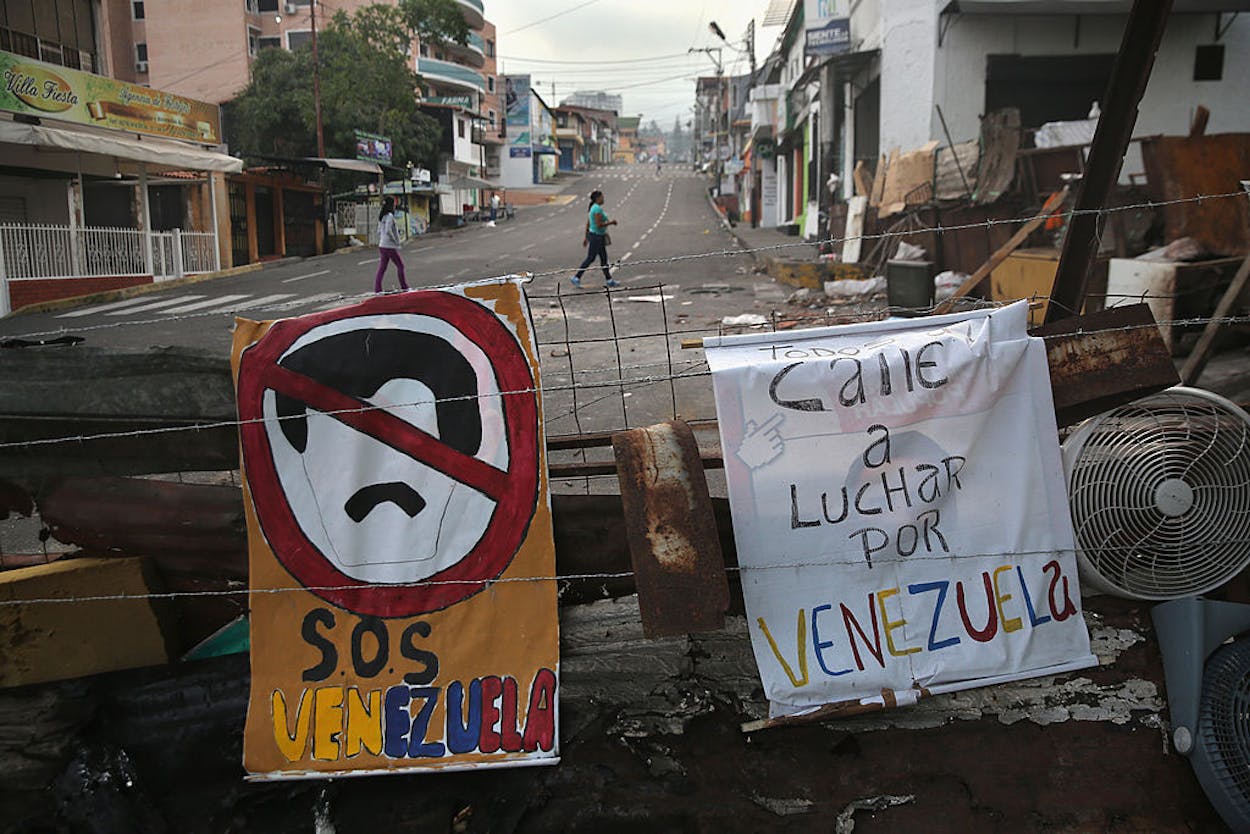As the political, social and economic fabric in Venezuela continues to disintegrate, the U.S. is reportedly mulling implementing stronger sanctions on the struggling nation, much to the chagrin of U.S. energy companies who depend heavily on the oil-producing nation in trade.
Last week, the Trump administration slapped sanctions on eight members of Venezuela’s all-powerful constitutional assembly, bringing the number of government loyalists targeted for human rights abuses and violations of democratic norms up to thirty, since anti-government protests began in April, according to the Associated Press. Harsh economic sanctions appear to be in the works, too. “In Venezuela we are seeing the tragedy of tyranny play out before our own eyes in our own hemisphere,” Vice President Mike Pence said during a trip to Argentina on Tuesday, according to Bloomberg. “The U.S. has many options for Venezuela. The the U.S. will continue to bring the full weight of economic and political power on Venezuela.”
But such sanctions could potentially have a hugely negative impact on the oil and gas industry in the U.S., and especially in Texas. The AP reported last week that the U.S. oil industry is worried about a potential ban on petroleum imports, because Venezuela is the third-largest supplier to the U.S. Such a move could drive up gas prices and cost jobs in the U.S., and the brunt of the impact would be felt in refineries along the Gulf Coast.
Nine companies, including Chevron, Valero, Citgo and Phillips 66, currently process Venezuelan crude in more than twenty refineries across the U.S., most of them located along the Gulf Coast, according to the AP. Valero and Phillips 66 are headquartered in Texas. Most of these refineries are designed for the kind of heavy crude that Venezuela exports. Replacing those supplies would be disruptive and costly. The American Fuel & Petrochemicals Manufacturers—an oil industry advocacy group whose members include those nine companies—has written two letters to Trump warning that other main sources of U.S. heavy crude imports (Canada, Mexico, and Colombia) might not be enough in the absence of Venezuelan oil. The refineries would probably instead look to Saudi Arabia, but the price increase of that move “could significantly impact fuel costs for U.S. consumers,” the letter states.
U.S. representative Randy Weber, a Republican representing Friendswood, led a group of lawmakers in writing a similar letter to Trump, according to the AP. Six Republican congressmen from three of the states that process Venezuela’s heavy crude—Texas, Mississippi, and Louisiana—signed the letter, warning Trump that banning Venezuelan oil imports would do more bad than good. Though the letter was careful to praise the president for his efforts to curb “the disturbing decline of democracy” in Venezuela, the lawmakers said sanctions could jeopardize 525,000 refining-related jobs along the Gulf Coast. “We fear that potential sanctions will harm the U.S. economy, impair the global competitiveness of our energy business and raise costs to consumers,” the July 28 letter said, according to the AP, which obtained a copy of the letter from a senior Venezuelan official. Congressman Weber did not respond to Texas Monthly‘s requests for comment.
Meanwhile, the situation in Venezuela is showing no signs of improvement. Last month, President Nicolás Maduro installed a new constituent assembly with total control to rewrite the constitution, and his regime has cracked down on opposition politicians, prosecutors, and protesters. A week ago, a group of soldiers and protesters laid siege to a Venezuela military base in an ill-fated attempt to spark an insurrection. With the nation teetering toward a total dictatorship, analysts are growing increasingly worried about the future of the Venezuela’s oil industry. “This country is sitting on a volcano, and anything can start it if the government handles something wrong,” Thomas O’Donnell, a fellow specializing in global energy systems at the American Institute for Contemporary German Studies, recently told CNBC.
- More About:
- Energy






